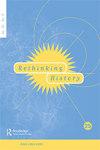视觉化记忆:电影制作作为研究中国战时历史的方法
IF 0.8
2区 历史学
Q1 HISTORY
引用次数: 0
摘要
摘要本文以我在湖南省南岳烈士陵寝的田野调查的成果和经验为基础,探讨了电影制作作为一种历史研究方法的问题。在那里,我制作了一部45分钟的纪录片《直到活着的记忆消退》(2020)。这座纪念阵亡中国士兵的战争纪念碑位于抗日战争(1937-1945)期间湖南的前线,在日本占领和共产党多年的抹杀中幸存下来,今天重新出现,被一群人参观,从而重新融入当代中国的战争叙事。通过分析电影中选定的场景,我绘制出了不同于文本的时间和空间存在,并讨论了这种基于实践的研究如何有助于当前的战争记忆研究。这部电影使用了视觉人类学的观察方法,将纪念景观、物质文化和个人行为之间的复杂关联可视化。它考察了记忆过程是如何被编码在感官、具体知识和生活体验中的,这些都是通过拍摄对象和在纪念空间组织的记忆工作之间的情感交流产生的。相机捕捉多层记忆行为的能力表明了将历史研究与电影制作实践结合起来的可能性。本文章由计算机程序翻译,如有差异,请以英文原文为准。
Visualising memory: filmmaking as research method to engage with China’s wartime past
ABSTRACT This article explores filmmaking as a historical research method by drawing on the output and experiences from my fieldwork at the Nanyue Martyr’s Shrine, Hunan province of China, where I produced a forty-five-minute documentary Till the Living Memory Fades (2020). Situated on the frontline of fighting in Hunan during the Resistance War against Japanese invasion (1937–1945), this war memorial, dedicated to fallen Chinese soldiers, has survived Japanese occupation and years of Communist erasure, re-emerging today to be visited by groups of people and thus being reincorporated into contemporary China’s war narrative. By analysing selected scenes from the film, I map out the temporal and spatial presence different from the text and discuss how this practice-based research contributes to the current memory study of war. The film uses observational methods from visual anthropology to visualise a complicated correlation between memorial landscapes, material culture, and individuals’ behaviour. It examines how remembering processes have been encoded in senses, embodied knowledge, and lived experiences, generated through affective communication between filmed subjects and the remembrance work organised in commemorative spaces. The capacity of camera to capture multi-layered acts of remembering points to the possibilities of bringing together historical research with practices of filmmaking.
求助全文
通过发布文献求助,成功后即可免费获取论文全文。
去求助
来源期刊

Rethinking History
Multiple-
CiteScore
1.20
自引率
0.00%
发文量
26
期刊介绍:
This acclaimed journal allows historians in a broad range of specialities to experiment with new ways of presenting and interpreting history. Rethinking History challenges the accepted ways of doing history and rethinks the traditional paradigms, providing a unique forum in which practitioners and theorists can debate and expand the boundaries of the discipline.
 求助内容:
求助内容: 应助结果提醒方式:
应助结果提醒方式:


